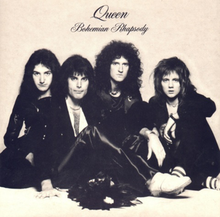
Back Bohemian Rhapsody ALS بوهيميان رابسودي Arabic بوهيميان رابسودى (اغنيه) ARZ Bohemian Rhapsody AST Bohemian Rhapsody Azerbaijani Bohemian Rhapsody Byelorussian Bohemian Rhapsody Bulgarian Bohemian Rhapsody BS Bohemian Rhapsody Catalan Bohemian Rhapsody CBK-ZAM
| "Bohemian Rhapsody" | ||||
|---|---|---|---|---|
 Artwork for UK and some other European singles | ||||
| Single by Queen | ||||
| from the album A Night at the Opera | ||||
| B-side | "I'm in Love with My Car" | |||
| Released | 31 October 1975 | |||
| Recorded | 24 August–September 1975[1][2][3] | |||
| Studio |
| |||
| Genre | ||||
| Length | 5:55 | |||
| Label | EMI | |||
| Songwriter(s) | Freddie Mercury | |||
| Producer(s) |
| |||
| Queen singles chronology | ||||
| ||||
| Music video | ||||
| "Bohemian Rhapsody" on YouTube | ||||
"Bohemian Rhapsody" is a song by the British rock band Queen, released as the lead single from their fourth studio album, A Night at the Opera (1975). Written by lead singer Freddie Mercury, the song is a six-minute suite,[4] notable for its lack of a refraining chorus and consisting of several sections: an intro, a ballad segment, an operatic passage, a hard rock part and a reflective coda.[5] It is one of the few progressive rock songs of the 1970s to have proved accessible to a mainstream audience.[6]
Mercury referred to "Bohemian Rhapsody" as a "mock opera" that resulted from the combination of three songs he had written. It was recorded by Queen and co-producer Roy Thomas Baker at five studios between August and September 1975. Due to recording logistics of the era, the band had to bounce the tracks across eight generations of 24-track tape, meaning that they required nearly 200 tracks for overdubs. The song parodies elements of opera with bombastic choruses, sarcastic recitative, and distorted Italian operatic phrases. Lyrical references include Scaramouche, the fandango, Galileo Galilei, Figaro, and Beelzebub, with cries of "Bismillah!"
Although critical reaction was initially mixed, retrospective reviews have acclaimed "Bohemian Rhapsody" one of the greatest songs of all time, and it is often regarded as the band's signature song. The promotional video is credited with furthering the development of the music video medium.[7][8] It has appeared in numerous polls of the greatest songs in popular music,[9] including a ranking at number 17 on Rolling Stone's 2021 list of the “500 Greatest Songs of All Time”.[10] A Rolling Stone readers' poll ranked Mercury's vocal performance as the greatest in rock history.[11]
"Bohemian Rhapsody" topped the UK Singles Chart for nine weeks (plus another five weeks following Mercury's death in 1991) and is the UK's third best-selling single of all time. It also topped the charts in countries including Canada, Australia, New Zealand, Ireland, and the Netherlands, and has sold over six million copies worldwide. In the United States, the song peaked at number nine in 1976, but reached a new peak of number two after appearing in the 1992 film Wayne's World. In 2004, the song was inducted into the Grammy Hall of Fame.[12] Following the release of the 2018 biopic Bohemian Rhapsody, it became the most streamed song from the 20th century.[13] In 2021, it was certified diamond in the US for combined digital sales/streams equal to 10 million units, and is one of the best selling songs of all time. In 2022, it was inducted into National Recording Registry by the Library of Congress being "culturally, historically, or aesthetically significant".
- ^ Lemieux, Patrick; Unger, Adam (11 April 2018). Queen Chronology/Bohemian Rhapsody. Lulu.com. p. 24. ISBN 9781926462103. Retrieved 6 January 2023.
August 24: Queen begins recording their fourth album with two weeks (September 7th) of sessions at Rockfield Studios
- ^ Queen Chronology/Bohemian Rhapsody. Patrick Lemieux, Adam Unger. 11 April 2018. p. 24. ISBN 9781926462103. Retrieved 6 January 2023.
Early September: Bohemian Rhapsody – the backing track is recorded during this time along with other "Opera" backing tracks
- ^ Queen Chronology/Bohemian Rhapsody. Patrick Lemieux, Adam Unger. 11 April 2018. p. 24. ISBN 9781926462103. Retrieved 6 January 2023.
Mid September -- November: following Rockfield sessions, Queen continues working on their 4th album in London
- ^ Horton, Matthew (24 June 2015). "Queen: 20 Things You Probably Never Knew About 'Bohemian Rhapsody'". NME. Archived from the original on 24 September 2015. Retrieved 24 August 2015.
a masterful, if ludicrous, six-minute suite of operatic cock-rock
- ^ Service, Tom (8 December 2009). "Bohemian Rhapsody: Mamma, we've killed a song". The Guardian. London. Archived from the original on 19 December 2015. Retrieved 23 August 2015.
- ^ Eisentraut, Jochen (2012). The Accessibility of Music: Participation, Reception, and Contact. Cambridge University Press. p. 111. ISBN 978-1107024830.
progressive rock had an astounding success with the theoretically over-length (nearly 6 minute) single 'Bohemian Rhapsody' which bore many of the hallmarks of the 'prog' genre
- ^ Sutherland, Mark (30 October 2015). "Party On: Queen's Brian May Remembers 'Bohemian Rhapsody' on 40th Anniversary". Rolling Stone. Archived from the original on 4 January 2016. Retrieved 4 January 2016.
- ^ Hann, Michael (12 June 2011). "Queen herald the age of the music video". The Guardian. Archived from the original on 11 March 2017. Retrieved 17 December 2016.
- ^ Cite error: The named reference
ITV pollwas invoked but never defined (see the help page). - ^ "Bohemian Rhapsody ranked #17 on Rolling Stone 500 Greatest Songs List". Rolling Stone. 15 September 2021. Retrieved 16 September 2021.
- ^ "Reader's Poll: The Best Vocal Performances in Rock History". Rolling Stone. 5 September 2012. Archived from the original on 22 December 2017. Retrieved 19 December 2017.
- ^ The Recording Academy 2004.
- ^ Thompson, Simon. "Queen's 'Bohemian Rhapsody' Is Officially The World's Most-Streamed Song". Forbes. Archived from the original on 16 December 2018. Retrieved 16 December 2018.